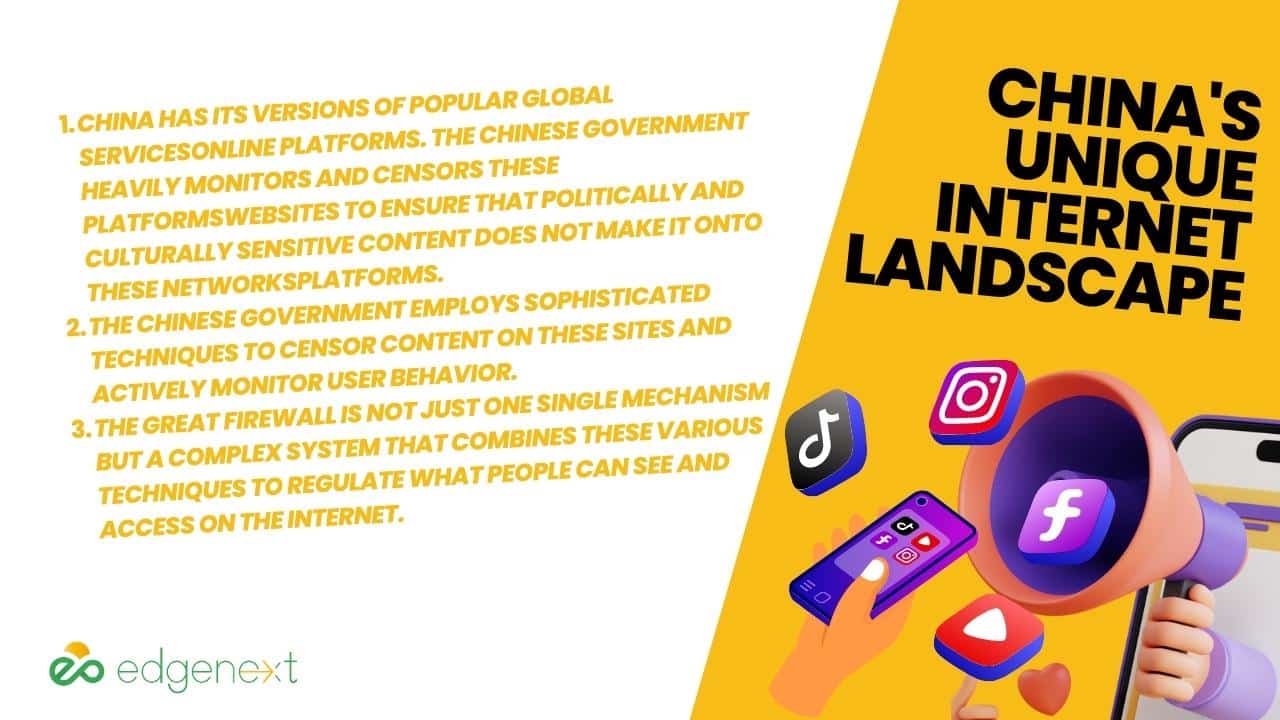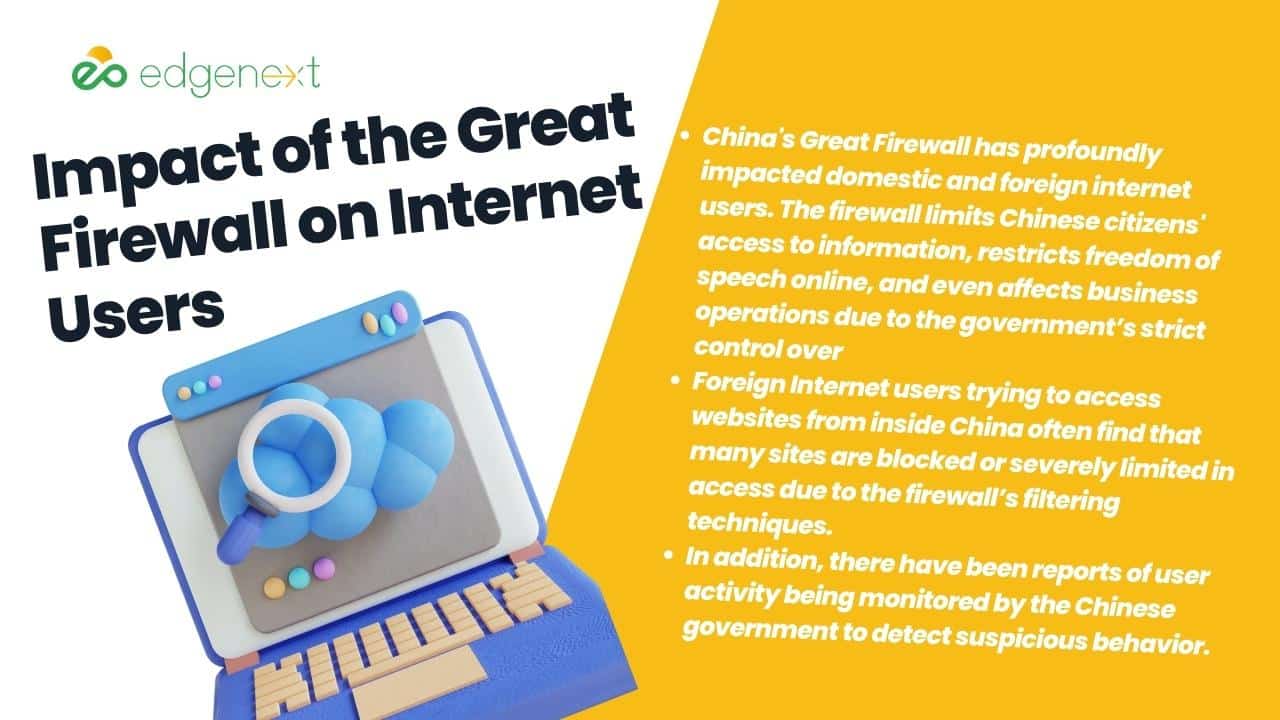
The internet in China is unlike any other in the world. It has been heavily regulated and filtered by the Chinese government for decades, creating an ecosystem unique to its own. This censorship system is better known as the “Great Firewall of China,” a term popularized by Western media to describe the country’s rigorous online restrictions. Despite its name, this firewall does not just block certain websites but instead actively monitors user behavior and activities. This article will explore precisely what comprises China’s Great Firewall and how it affects everyday people’s online access to information.

When looking at China’s unique internet landscape, it is immediately apparent how different it is from the rest of the world. China has its versions of popular global online platforms, such as Google being replaced by Baidu and YouTube by Youku. The Chinese government heavily monitors and censors these websites to ensure that politically and culturally sensitive content does not make it onto these platforms. All websites must apply for a license from the Chinese government to be accessed in mainland China– if a website fails to comply with their rules, they risk being blocked or severely limited in access.
Other than replacing foreign websites with domestic ones, the Chinese government employs sophisticated techniques to censor content on these sites and actively monitor user behavior. China has an extensive network of more than 10,000 censors and internet control team working to monitor the online activity of its Internet users. This includes blocking certain websites and keywords, preventing access to foreign sites, and tracking user activities to detect suspicious behavior. By controlling the flow of information available online, the Chinese government can effectively limit its Internet users’ exposure to outside perspectives.
The Great Firewall is not just one single mechanism but a complex system that combines
these various techniques to regulate what people can see and access on the internet. Despite its effectiveness in curating content for Chinese Internet users, this system has been criticized by many as being too restrictive and oppressive – a view shared by many who live within the country. China’s internet landscape is, without a doubt, very different from what we experience in the West and continues to be an ongoing topic of debate worldwide.
The Great Firewall of China is a system of censorship and monitoring that the Chinese government uses to control its Internet users ’ access to online information. It was first implemented in 2003 as part of a series of regulations designed to maintain party control over the public discourse on the Internet. This system uses various techniques, such as blocking certain websites or keywords from being accessed, preventing users from connecting to foreign sites, and actively tracking user activities for suspicious behavior. By controlling what information can be accessed online, the Chinese government has been able to limit its Internet users’ exposure to outside perspectives and ideas.
Despite being criticized by many as oppressive and restrictive, this firewall remains one of China’s most effective systems for curating content. It has been credited with helping to keep the country’s citizens from accessing sensitive political and cultural content while still allowing them access to general news, education and entertainment. The effectiveness of the Great Firewall is such that many countries have adopted similar systems in their attempts to control online information.
The Great Firewall of China is an intricate system that uses various methods to restrict and control online content. It does this by employing techniques such as IP blocking, which prevents access to certain websites or services based on their IP address; DNS filtering and redirection, which redirects requests from websites that are blocked to other sites, URL filtering, which blocks specific URLs and keywords, packet filtering which examines data packets for forbidden content before they reach their destination, and VPN blocking which prevents users from accessing virtual private networks.
These techniques allow the Chinese government to control what can be accessed online. The firewall is constantly being updated with new methods and technologies to remain effective in curating content for the Chinese Internet users. This system has been so successful that other countries have adopted similar filters and censors to regulate online information.

China’s Great Firewall has profoundly impacted domestic and foreign internet users. The firewall limits Chinese citizens’ access to information, restricts freedom of speech online, and even affects business operations due to the government’s strict control over what can be seen or said on the internet. Foreign Internet users trying to access websites from China often find that many sites are blocked or severely limited in access due to the firewall’s filtering techniques.
In addition, there have been reports of user activity being monitored by the Chinese government to detect suspicious behavior. Many have criticized this censorship and monitoring system as oppressive and restrictive – a view shared by those living within the country. Nonetheless, it remains one of the most effective systems for curating content in China and will likely remain in use for some time.
Despite the restrictions imposed by the Great Firewall of China, many users have found ways to bypass these filters and access restricted content. The most common methods for circumventing the firewall include virtual private networks (VPNs) and proxies. Both services use encryption techniques to mask a user’s IP address and allow them to access to certain websites or services otherwise blocked in China.
However, legal and ethical implications are associated with using such tools to bypass government regulations. In some cases, this activity could be considered illegal depending on local laws or online terms of service agreements. Using VPNs or proxies also has the potential to harm other users by exposing them to malicious software or malware when accessing these sites. As such, users should be aware of the risks associated with bypassing the Great Firewall and take necessary precautions.
In conclusion, the Great Firewall of China remains one of the country’s most effective systems for curating content. It has profoundly impacted domestic and foreign internet users, limiting freedom of speech and access to information online. Despite its detractors, the firewall continues to be an ongoing topic of debate worldwide. Those wishing to bypass these filters can use VPNs or proxies, though they should know that this activity may have legal and ethical implications. Ultimately, it is up to each user to decide if attempting to circumvent censorship is worth it for them.
In conclusion, the Great Firewall of China has been a controversial topic since its inception. It has drastically altered internet use in China by curating content and limiting access to certain websites or services. The firewall’s various techniques have allowed the Chinese government to maintain tight control over what content can be accessed online in the country, and many other nations have adopted similar systems in their attempts to regulate online information.
Though it remains an effective system for controlling content, some still criticize the Great Firewall as oppressive and restrictive. Whether this censorship will continue is uncertain – though it is likely that some form of regulation will remain regardless of how technology or global attitudes toward internet use evolve. Ultimately, only time will tell how the Great Firewall and internet use in China will be affected in the future.
Reference:
TechTarget. (n.d.). Great Firewall of China. https://www.techtarget.com/whatis/definition/Great-Firewall-of-China
EdgeNext. (n.d.). China CDN. https://www.edgenext.com/china_cdn/
EdgeNext. (n.d.). Choosing the right China connectivity solution for your global business. https://www.edgenext.com/choosing-the-right-china-connectivity-solution-for-your-global-business/
Kaspersky. (n.d.). What is a VPN? https://usa.kaspersky.com/resource-center/definitions/what-is-a-vpn
© 2025 EdgeNext Copyright All Right Reserved